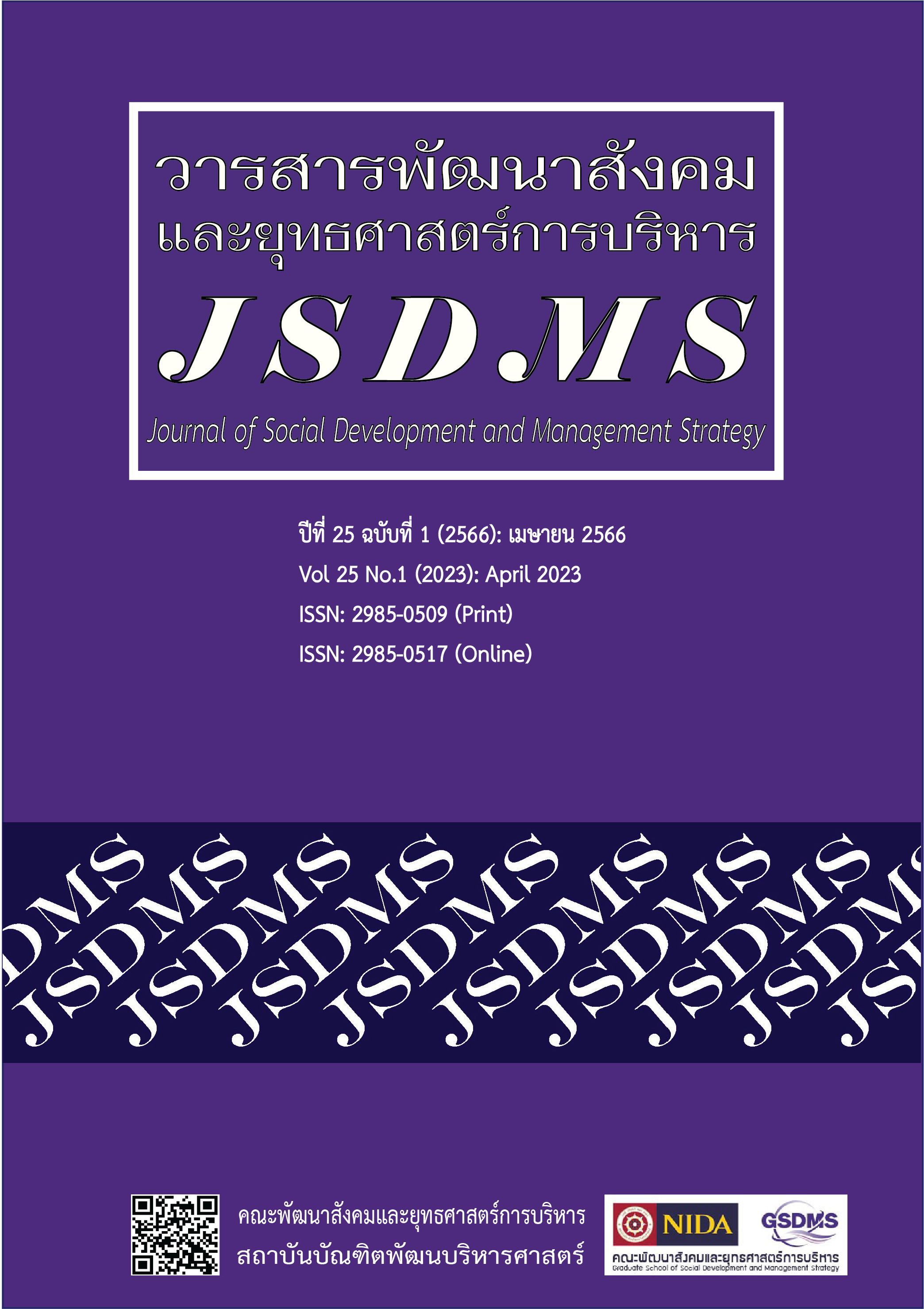Knowledge Status on Eco City and Self-Sufficient Economy as Social Capital amidst the Covid-19 Pandemic
Main Article Content
Abstract
The 3 purposes of this article were to 1) present the whole picture of the eco-city and self-sufficient economy concepts which have been adapted as social capital during the covid-19 pandemic. 2) review the related literature and previous studies as social capital and 3) suggest to development to such body of knowledge as social capital to solve community problem during the covid-19 pandemic. The study uses qualitative methods i.e., documentary analysis, field sites survey with non-participant observation including urban ethnography with cases of study around inner city and outskirt of Bangkok and periphery to gather the whole picture of such body of knowledge. The result of the study reveals that there is not less study has mentioned the body of knowledge in eco-city and self-sufficient economy before the covid-19 pandemic for example in urban development concept based on the equilibrium of urban space and environment. On the spatial presentation of such body of knowledge which is related to self-sufficient economy, it is found that there are a lot of community participation in many areas. Agricultural area and organic vegetable garden space are increased. This is to create the economic community base. The space creation leads to the policy suggestion for the model of community learning center in responsible of municipality and Bangkok Metropolitan Administration to develop and turn abandoned space into green area in various types. It includes the body of knowledge development as social capital in terms of communal food security during covid-19 pandemic and other situation in the future.
Article Details

This work is licensed under a Creative Commons Attribution-NonCommercial-NoDerivatives 4.0 International License.
References
Basham, R. D. (1978). Urban anthropology: The cross-cultural study of complex societies. Palo Alto Calif: Mayfield Publishing Company.
Bhorntida Thepprasit, & Thirawat Chuntuk. (2019). “Sustainable eco university in social, economic and environmental dimensions” [In Thai]. Veridian E-Journal, Silpakorn University (Humanities, Social Sciences and Arts), 12(1), 371-385.
Budsakorn Roongsawang. (2022). Benjakitti Public Park which think of the past, present, and future of Bangkok people [In Thai]. Sarakadee Magazine, 38, 104-117.
Chaipattana Foundation. (2020). Chaipattanaprachakasem (Chaipattana Foundation) [In Thai]. Retrieved from https://www.chaipat.or.th/royal-projects-in-various-regions/central-east/983-central-west/10015-2019-05-07-02-18-19.html
Chombhak Klangrahad, Pannakorn Nakhorn, & Kanyaphatsaporn Rungrueng. (2017). The Success Factors of Urban Agriculture
[In Thai]. In Proceeding of the 4th National Conference of Public Affairs Management “Public Affairs Management Under Thailand 4.0),” (pp. 811- 826). Khon Kaen: College of Local Administration Khon Kaen University.
Community Organization Development Institute. (2021). Synergy of Society-Community’ through Covid!!. Retrieved from https://web.codi.or.th/20210916-27283/
Dao Chumtakhob. (2020). Sufficiency economy: An alternative survival strategy for the covid-19 pandemic [In Thai]. Journal Multidisciplinary Academic Research and Development, 2(3), 11-22.
Going Together. (2019). House 1,000 wood café & farm – Agricultural learning source for youth [In Thai]. Retrieved from https://www.paiduaykan.com/travel/BannKhorngPhor
Kamin’s Roaming. (2021). Sathaneepak & Khon Rak Kafae [In Thai]. Retrieved from https://www.facebook.com/1555518224743544/posts/2701928673435821/
Kapook. (2018). Pointing 5 Farms & Gardens Hiding in Bangkok [In Thai]. Retrieved from https://travel.kapook.com/view192404.html
Local Development Institute. (2020). Covid crisis and the turning point of local community [In Thai]. Retrieved from https://www.ldi.or.th/2020/04/29/Covidcrisisandtheturning point/
Manager Online. (2020a). “Bann Nongbuanoi” Changwat Kalasin – an example of public land use for community economic [In Thai]. Retrieved from https://mgronline.com/local/detail/9630000044545
Manager Online. (2020b). Department of Community Development supports Thai people to grow kitchen garden for food security [In Thai]. Retrieved from https://mgronline.com/politics/detail/ 9630000036433
Manager Online. (2020c). Governer Chonburi invites people flip Covid-19 crisis to chance in growing kitchen garden [In Thai]. Retrieved from https://mgronline.com/local/detail/9630000036887
Manager Online. (2020d). Khaoyoi has love growing vegetable for friend [In Thai]. Retrieved from https://mgronline.com/local/detail/9630000045527
Manager Online. (2020e). MQDC creation of the new standard “Biodiversity Standard” [In Thai]. Retrieved from https://mgronline.com/greeninnovation/detail/9630000127727
Office of Natural Resources and Environmental Policy and Planning. (2019). Final report of the project of moving eco city development model concept (Ecological city: Eco-city) for urban environmental and sustainable community [In Thai]. Bangkok: Wasu Copy 1995 Limited Partnership.
Office of the National Economic and Social Development Council. (2022). Draft of the 13th National Economic and Social Development Plan [In Thai]. Retrieved from https://www.nesdc.go.th/download/Plan13/Doc/Plan13_DraftFinal.pdf
Panit Pujinda & Yosapol Boonsom (2016). Urban design guideline for specific purposed towns [In Thai]. JED: Journal of Environmental Design, 3(1), 21-43.
Pasrin Phannan. (2018). Urban agriculture garden development and the community empowerment: A case study of Poonsap community, Saimai district, Bangkok [In Thai]. Romphreuk Journal, 36(3), 68-95.
PTT Reforestation and Ecological Institute. (n.d.). History of “Urban forest Learning center” [In Thai]. Retrieved from https://www.pttreforestation.com/Educationview.cshtml?Id=8
Register, R. (2006). Eco-cities: Rebuilding cities in balance with nature (Revised ed.). Canada: New Society Publishers.
Roseland, M. (1997). Dimensions of the eco-city. Journal of Cities, 14(4), 197-202.
Saad, M. M., Ibrahim, M. A., & Sayad Zeyad M. E. (2017). Eco-city as approach for sustainable development. American Scientific Research Journal for Engineering, Technology, and Sciences (ASRJETS), 28(1), 54-74.
SaiThong Farmily. (2021). SaiThong Farm vegetable farm in the middle of city and healthy food in Lanthong village Pak Kret [In Thai]. Retrieved from https://www.facebook.com/615984995245159/posts/1901604576683188/
SME Thailand Club. (2019). Check in 5 farm say in Bangkok [In Thai]. Retrieved from https://www.smethailandclub.com/trick-3921-id.html
Sustainable Agriculture Foundation (Thailand). (2021). Food economy in urban communities in the midst of the covid crisis [In Thai]. Retrieved from https://sathai.org/?p=2685


